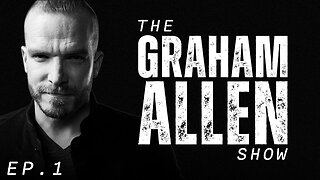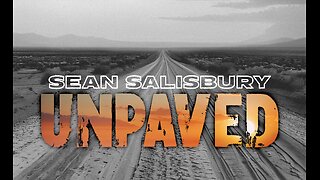Premium Only Content

Seek first His kingdom
I invite the congregation with: "Right now, let's respond by seeking Him first. If you're carrying worries, lay them down at His feet. Raise your hands, pray silently, or come forward for prayer as we declare His kingdom priority in our lives." This encourages active faith application, tying back to Matthew 6:33's promise.
https://storiesthatheal.blogspot.com/2016/09/bible-quote-sep-28th-matthew-633.html
Verse 1
In the whisper of the wind, You call my name
Beyond the worries of this world, Your kingdom reigns
Like lilies in the field, clothed in Your grace
I lift my eyes to You, in this sacred place
Chorus
Seek first Your kingdom, oh Lord
And Your righteousness, forevermore
All these things will be added, in Your perfect time
Man does not live by bread alone, but by every word from Your throne
We seek You first, we seek You first
Verse 2
From ancient words You spoke, in the mountaintop light
You taught us not to fear, in the dead of night
Your promise echoes through the ages, strong and true
In every trial, we find our hope in You
Chorus
Seek first Your kingdom, oh Lord
And Your righteousness, forevermore
All these things will be added, in Your perfect time
Man does not live by bread alone, but by every word from Your throne
We seek You first, we seek You first
Bridge
No more chasing shadows, no more empty strive
In Your presence, we come alive
Surrender all our fears, lay them at Your feet
Your word sustains us, makes our joy complete
Oh, we trust in Your provision, day by day
In Your kingdom, we find our way
Chorus
Seek first Your kingdom, oh Lord
And Your righteousness, forevermore
All these things will be added, in Your perfect time
Man does not live by bread alone, but by every word from Your throne
We seek You first, we seek You first
We seek You first
=
Matthew 6:33 from the New King James Version (NKJV) reads: "But seek first the kingdom of God and His righteousness, and all these things shall be added to you."
This translation maintains a formal equivalence to the original Greek text, emphasizing clarity and readability while staying close to traditional wording.
Background
Matthew 6:33 is part of Jesus' Sermon on the Mount, recorded in Matthew chapters 5–7, which is one of the most extensive teachings of Jesus in the Gospels. In the immediate context (Matthew 6:25–34), Jesus addresses worries about daily needs like food, drink, and clothing, comparing human anxiety to how God cares for birds and lilies. He contrasts this with the pursuits of "Gentiles" (non-Jews), urging followers to prioritize God's kingdom instead of material concerns. The verse serves as a pivotal command in this section, promising divine provision for those who align their lives with God's priorities. Thematically, it ties into broader Jewish concepts of righteousness (tsedeq in Hebrew, dikaiosynē in Greek), echoing Old Testament ideas like seeking God wholeheartedly (e.g., Deuteronomy 4:29 or Psalm 37:4).
History
The verse appears in the Gospel of Matthew, the first book of the New Testament, which is one of the three Synoptic Gospels (along with Mark and Luke) due to their shared content and structure. Historically, this Gospel emerged in a post-resurrection Christian community, likely addressing Jewish-Christian audiences familiar with Old Testament prophecies, as it frequently quotes or alludes to them to present Jesus as the fulfillment of messianic expectations. The Sermon on the Mount, including 6:33, reflects Jesus' oral teachings during his ministry in Galilee around 30 AD, but the written form came later as early Christians compiled accounts to preserve and spread the message.
The authorship is traditionally attributed to Matthew (also called Levi), a former tax collector and one of Jesus' twelve apostles (Matthew 9:9–13), though the text itself is anonymous. Early church fathers like Papias (c. 125 AD) and Irenaeus (c. 180 AD) supported this attribution, suggesting Matthew initially wrote in Aramaic or Hebrew before a Greek version circulated. However, modern scholarship often views it as composed by an anonymous Jewish Christian scribe or community, incorporating earlier sources. The date of composition is debated: a majority of scholars place it between 80–90 AD, after the destruction of the Jerusalem Temple in 70 AD (alluded to in Matthew 24), possibly in Antioch or another urban center with a mixed Jewish-Gentile population. Some conservative views argue for an earlier date, around 50–65 AD, based on internal evidence and patristic traditions. The earliest manuscript evidence for Matthew comes from fragments like Papyrus 104 (c. 175 AD), with fuller codices appearing in the 4th century.
How It Was Written
The Gospel of Matthew was composed in Koine Greek, the common language of the eastern Roman Empire, rather than Aramaic (Jesus' spoken tongue). It likely drew from earlier written sources, including the Gospel of Mark (c. 65–70 AD) as a primary framework under the two-source hypothesis, plus a hypothetical "Q" source (shared sayings with Luke) and unique material ("M" source). The author structured the text thematically, grouping teachings like the Sermon on the Mount to emphasize Jesus' authority as a teacher and king. Verse 6:33 itself uses imperative language ("seek first") to convey urgency, with "kingdom of God" reflecting Jesus' central message of God's reign breaking into history. The writing process involved oral traditions from eyewitnesses, compiled into a narrative for teaching, evangelism, and community edification in early churches.
Application
In Christian life, Matthew 6:33 calls believers to make God's kingdom—the realm where His will is done—and personal righteousness (living in alignment with His standards) the top priority, trusting that material needs will follow. This counters anxiety about daily provisions, encouraging faith in God's providence rather than self-reliance or worldly pursuits. Practically, it applies through daily disciplines like prayer, Bible study, ethical living, and service, fostering a mindset where spiritual growth trumps career, wealth, or status. For example, it inspires decisions like choosing integrity in business or volunteering time for ministry over extra work hours. Theologically, it echoes Eden-like harmony, where seeking God restores peace and abundance amid life's threats. Many interpret it as a promise not for luxury but for sufficiency, promoting contentment and generosity.
=
-
 5:29
5:29
oDDBall daily bible quotes
1 month agoLife Awakened Psalm 119:93
912 -
 57:39
57:39
Dear America
1 hour agoThe Government Is Closed And Netflix Wants Your Kids! + Revival Happens If We Keep Moving Forward
15.4K23 -

The White House
3 hours agoPress Secretary Karoline Leavitt Briefs Members of the Media, Oct. 1, 2025
17.5K9 -
 53:14
53:14
The Kevin Trudeau Show Limitless
4 hours agoKevin Trudeau Reveals the Crypto Secrets Only the Ultra-Rich Know
2645 -
 3:36
3:36
Michael Heaver
4 hours agoItaly Witnesses POWERFUL Election Victory
5.14K1 -
 12:51
12:51
Silver Dragons
16 hours agoIs Silver a Good Buy at an ALL TIME HIGH?
563 -
 23:38
23:38
Professor Nez
1 hour agoCandace Owens Just BROKE the Internet with Charlie Kirk BOMBSHELL!
6.8K5 -
 DVR
DVR
Side Scrollers Podcast
4 hours agoMASSIVE Netflix Boycott + The TRUTH About Jimmy Kimmel’s Return + BIG Side Scrollers NEWS
9.71K -
 LIVE
LIVE
Sean Unpaved
2 hours agoWild Card Highlights, Eagles' Lucky Streak, Gabriel Takes QB1, & CFB Hot Seat Watch
49 watching -
 1:36:16
1:36:16
MattMorseTV
2 hours ago $1.63 earned🔴Trump's Press Conference on the SHUTDOWN.🔴
2.44K18